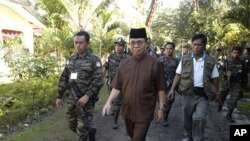The Philippine government and a Muslim separatist group say they hope to lay the groundwork for lasting peace this year.
The Moro Islamic Liberation Front says the “comprehensive compact” it submitted to the Philippine government proposes solutions to ending its fight for self-determination in the southern island of Mindanao.
Marvic Leonen is chief peace negotiator for Philippine President Benigno Aquino. He says his team will study the MILF position closely.
“We intend to review it, relate to past documents, work with our principals, which also includes doing consultations with all those affected," Leonen said. "This is the expectation of President Benigno Aquino, who will give us the mandate before we state our position on the drafts presented.”
After two days of talks ended on Thursday, the two sides said they intend to push forward on peace talks this year.
Leonen says the MILF significantly scaled back its land claim, which makes his team cautiously optimistic.
“This is the starting point and the position of the MILF," Leonen said, "starting point and the position of the MILF. It could have been different. It could have been a document of independence. It could have been a document claiming more areas.”
The MILF has fought for control of ancestral lands for four decades. The majority of Filipinos are Christians, but a large Muslim population lives in the south.
The last peace talks halted in 2008 after the Supreme Court struck down an agreement that would have given the Autonomous Region of Muslim Mindanao more land and its own judicial system. Fighting between the two sides escalated, and hundreds of civilians were killed and hundreds of thousands displaced.
Pete Troillo is with the Manila office of the security risk analysis firm Pacific Strategies and Assessments. He says unless there is a major shift in strategy, talks are likely to continue their pattern of starting and stopping. He says three issues must be addressed in the region if the government wants lasting peace.
“One is tax revenues and how they’re spent. The other is mineral wealth and who gets the share," said Troillo. "And the third is security provisioning. And as far as I know there have been no concessions, really legitimate or defined concessions in any of those areas.”
Both sides also agreed to continue the services of an international peace monitoring team for the next year, to make sure the ceasefire that began in 2009 continues. They are expected to meet again next month.
Philippines Peace Talks Resume




